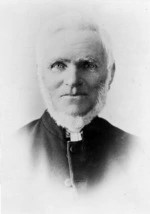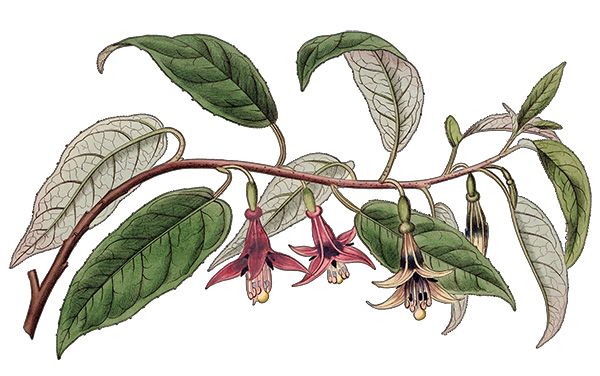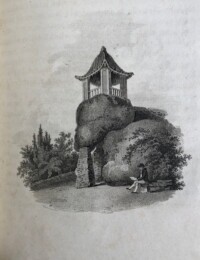Diaries and journals are often attractive for their attention to the mundane. This seems to humanize the writer. But then sometimes, there springs out observations, events, meetings or conversations that touch the imagination, make you laugh, or give an unexpected insight. I’ll always remember the imagery elicited in the journalistic account by Johann Christian Hüttner, translator and tutor to the young George Staunton in Lord Macartney’s great embassy to the Qianlong Emperor in Peking in 1793[1]. It is early morning and the embassy in all its finery, along with the imperial court, the mandarins, the guards, and a multitude of attendants are talking and moving around in the ground of Yuan-Ming-Yuan, the Summer Palace, when all fall silent, and then in the distance they hear music and slowly the great Emperor appears moving with his entourage and they all kneel as he approaches. And as Hüttner describes it, somehow, we are there.
But let’s turn to early New Zealand. One of the most vivid diaries is that of the Rev John Butler[2] in the 1820s in the Bay of Islands, as he and his family struggle to establish themselves in their mission at Kerikeri, engaging with Hongi Hika and the early turbulence with Māori, other missionaries, trying to farm and providing an immediate and vital account of those early days.
There is another much later journal well worth reading. At the rather indeterminate end of the Northern War, or Heke’s war, in 1845, the Rev Robert Burrows, who published his diary of the conflict much later in 1886, records events which somehow reflect the whole uncertain, slightly strange nature of the period[3]. As missionaries, Burrows and Archdeacon Henry Williams roamed freely between Heke and Kawiti’s fighting groups and their pas, friendly with, and called on by, both leaders, and equally with the Imperial and colonial troops and their leaders such as Colonel Despard, warily providing information to all parties, trying to broker peace, attending the wounded and somehow protected by all.
He rore kiore
At the end of his journal, Burrows records the exchange of letters between the newly appointed Governor Grey, who had taken over from Fitzroy, and Heke and Kawiti, offering a conditional peace. Grey himself turned up at the Bay of Islands, and the letters having been delivered, he addressed some of Kawiti’s men and local Māori gathered at Kororareka. Burrows: ‘He assured them that he had been sent by Her Majesty the Queen not to set aside the Treaty of Waitangi, but to uphold it. That no portion of their lands would be taken from them, nor alienated in any way without their consent. That they were at liberty to sell or withhold from sale any portion or the whole of it at their discretion; but he would have them to clearly understand that having once sold, it was gone forever. As to the terms for peace, which had been offered by his predecessor, he had written a joint letter to Heke and Kawiti, giving them from Tuesday next to send to him a decided answer, yes or no. If they refused, he should hold no further communication with them.’ Burrows and Williams were instrumental in the communications between Grey and the chiefs, and Burrows records that Heke insisted that his people needed to agree on his response. He gathered them, and read out Grey’s letter, commenting on it. Burrows: ‘The Treaty of Waitangi,’ he called out, so as to be heard by all, ‘he rore kiore (a mouse or rat trap). Let the Governor and his soldiers go back to England, to the land that God has given them, and leave New Zealand to us, to whom God has given it. No, we will not give up our lands. If the pakeha wants out country, he will have to fight for it, for we ill die upon our lands.’
Hone Heke pokai hou
Heke was not without humour. His letter in response to that from Grey, predictably was one of total rejection. Burrows asked him, in vain to tone it down, ‘as it was one by no means exhibiting respect for the Queen’s representative. The Governor had signed himself, in his letter to Heke, as the “Kawana Hou” (the new Governor); Heke, in his answer, signed himself: “Hone Heke Pokai Hou” (the new John Heke Pokai).’
A short holiday
Student will do anything for fun, even holidaying in a war zone. Burrows records, just prior to Heke formulating his response: ‘Saturday – returned to the Waimate this morning accompanied by two or three of St John’s students from the Tamaki, who had chosen to come northward to spend a part of their holidays.’
Sleeping on gunpowder
At Heke’s insistence, Burrows stayed overnight at Heke’s headquarters while Heke was getting agreement on his response to Grey. After sitting in on Heke’s meeting with his people discussing Grey’s letter and the response, Burrows says: ‘I was very tired and asked to be shown where I was to sleep. I was conducted to a shed standing alone at some little distance from their own huts, and shown a raised platform in one corner, carefully covered over with native mats, and a couple of blankets spread over them. There was neither lamp or candle; a torch was burning some distance from the doorway of the hut. I was alone and soon fell asleep. Tuesday – Up at daylight. Curiosity led me to lift the mats covering the platform upon which I had been sleeping, and I discovered that it consisted of some twenty kegs of gunpowder, carefully placed upon thick rough-hewn planks laid on the earthen floor, with planks of the same kind laid over them.’ Somehow, along with the good story and an understanding of the absence of lights and the distant torch, something of Burrows the missionary comes through, alone in place and within the conflict.
We will wait and see
Grey was true to his statement that a refusal of the peace offer meant ceasing all communications with Heke and Kawiti. The last of the fighting was with the attack on the Ruapekapeka pa which the British eventually claimed they took, although it had been abandoned by the Māori, and Heke apparently had never been in the pa, but had taken up a position at the rear, where he was involved in the fighting. This was another example of the Māori strategy of fighting and withdrawal, which left the result of the whole conflict undetermined. There was no military retaliation, all sides seemed to have had enough, and a proclamation from Auckland said that all combatants could return in peace to their homes. Burrows sums it up well: ‘It would be difficult, perhaps, to surmise whether the rebels were the best pleased to lay down their arms and go quietly to their settlements, or the Queen’s representative to be able to thus honorably, to put an end to the state of things highly distasteful to himself, and bringing neither honour nor glory to anyone.’
But there was a coda. Some time after the peace, Grey returned to the Bay, and said he would like to ‘shake hands’ with Heke, and asked Burrows to arrange a meeting. And so ‘a morning or two after, the Governor and Heke met and breakfasted at my table. The interview was not a long one, and no reference was made to the past. Heke and the people who were with him were encouraged to return to industrial habits, and were ensured of the Queen’s regard for the welfare of the Māori race, etc. While the Governor was speaking, I could see an occasional glance from Heke to the chiefs who were sitting on the floor around, which, from long familiarity with his face and manner, I had no difficulty in interpreting to mean “we will wait and see”.’ It was wise, perhaps, that neither talked of the war.
Heke died from tuberculosis a years later in 1850, though already an unwell man at the end of the war. Te Ruki Kawiti died four years later from measles. And what about the Rev Burrows? Robert burrows (1812-1897) arrived in the Bay of Islands just after the signing of the Treaty. He was based at Waimate during the Northern War, and briefly returned to England for two  years in 1853. On his return to New Zealand he was secretary of the Church Missionary Society and appeared to oversee its affairs until he resigned from ill health in 1894. He says in his Preface, addressed from St Stephen’s Rd in Auckland, that he had been encouraged by Sir William Martin, years ago, to preserve his journal so that ‘the facts and circumstances connected therewith [the Northern War] ought not to be lost to our children.’ So ‘having been confined to my home for the last month, I have employed my time in putting together what follows. ‘ Burrows was married to Charlotte (1806-1888) and he died in Auckland in 1897.
years in 1853. On his return to New Zealand he was secretary of the Church Missionary Society and appeared to oversee its affairs until he resigned from ill health in 1894. He says in his Preface, addressed from St Stephen’s Rd in Auckland, that he had been encouraged by Sir William Martin, years ago, to preserve his journal so that ‘the facts and circumstances connected therewith [the Northern War] ought not to be lost to our children.’ So ‘having been confined to my home for the last month, I have employed my time in putting together what follows. ‘ Burrows was married to Charlotte (1806-1888) and he died in Auckland in 1897.
[1] https://www.hakluyt.com/downloadable_files/Journal/Huttner.pdf
[2] Butler, J. Earliest New Zealand. The journals and correspondence of the Rev. John Butler, compiled by R.J.Barton. Masterton, N.Z. Palamontain & Petherick. 1927
[3] Burrows, Rev. R., Extracts from a diary kept by the Rev R. Burrows during Heke’s War in the north, in 1845. Auckland, Upton & Son, 1886.

 years in 1853. On his return to New Zealand he was secretary of the Church Missionary Society and appeared to oversee its affairs until he resigned from ill health in 1894. He says in his Preface, addressed from St Stephen’s Rd in Auckland, that he had been encouraged by Sir William Martin, years ago, to preserve his journal so that ‘the facts and circumstances connected therewith [the Northern War] ought not to be lost to our children.’ So ‘having been confined to my home for the last month, I have employed my time in putting together what follows. ‘ Burrows was married to Charlotte (1806-1888) and he died in Auckland in 1897.
years in 1853. On his return to New Zealand he was secretary of the Church Missionary Society and appeared to oversee its affairs until he resigned from ill health in 1894. He says in his Preface, addressed from St Stephen’s Rd in Auckland, that he had been encouraged by Sir William Martin, years ago, to preserve his journal so that ‘the facts and circumstances connected therewith [the Northern War] ought not to be lost to our children.’ So ‘having been confined to my home for the last month, I have employed my time in putting together what follows. ‘ Burrows was married to Charlotte (1806-1888) and he died in Auckland in 1897.
